How to keep children (or Dan) occupied on a bike ride
So we can all agree that cycling is the BEST mode of transport, right? And every now and then you might be tempted to stretch your legs a little and maybe cycle somewhere new, that might take a little longer? Maybe a little cycle tour? Maybe an epic cycle tour? With children? Yes!
All of these are possibilities, and are a combination of Type 1 fun, an adventure, a chance to see and experience new thangs, a great way to chill out, and of course, Type 2 fun (the kind that’s only fun after the event, because in reality it wasn’t fun).
Anyway two of the gang Rob and Dan (aka me) recently went on such a bike ride, and had a blast. Because we’re a bit daft we didn’t do a lot of planning, and as result had some long days in the saddle. In all honesty sensible conversation dried up after the first hour or two, and Rob needed to keep Dan (aka me) occupied one way or another.
Here are some of the resulting games deployed by Robert to stop Dan (aka me) getting distracted by literally anything else that caught his (my) eye whilst riding his (my) bike, and enabled us (Rob and Dan) to get to our destination.
A game compendium
The Game
All participants of the ride are encouraged to make up games during the ride. Expectation is that all participants in the ride will also participate in all games. Participants are encouraged to make up games that are light-hearted, overly complicated, idiotic, humorous, and stimulate debate regarding rules, sub rules and scoring. It is acceptable for a game to be proposed, immediately started, and for the subtlety of rules to be resolved at a later date. On occasion said game maybe be forgotten as quickly as it was created.
All games played contribute to the overall score at the end of play each day. The intention is that the combination of all games and all rules are so complicated no one is declared the winner, or if one is declared that no one else cares.
Someone aimlessly cycling under a bridge
Over Under
A turn-based game. Participants score points based on their ability to predict the nature of the next road or rail crossing, as Over, Under, Level, or une Doublee Magnifique.
The number of participants and order of play is agreed in advance of the game commencing.
The first participant takes his turn by predicting whether the next crossing will be, by making a 'call':
Under: the current route passes beneath the next identified crossing e.g. tunnel
Over: the current route passes over the next identified crossing e.g. bridge
Level: the current route crosses the next identified crossing at the same level eg. crossroads
Doublee Magnifique: the current route crosses both over and under the next identified crossing
At the same time all other participants also make a prediction or 'call', either agreeing with the first participant, or proposing an alternative crossing prediction or 'call'.
The round is duly completed and scored, and the next participant takes their turn accordingly.
Participants should use a combination of observations regarding the lie of the land, route gradients, and good fortune to predict the nature of the crossing.
Any prior knowledge of infrastructure is strictly forbidden. Prior knowledge includes a route previously ridden by a participant, research of the route in advance of the ride, or any assessment made using gadgetry during the ride. It is permitted to use gadgetry to identify upcoming rounds of the game, but only at a resolution where no benefit can be gained in any prediction of the next crossing.
Scoring:
A correct call by the participant on turn receives two points, or deux point. An incorrect call receives zero points, or nil point.
A correct call by other participants making an agreeable call receive 1 point, or where they have proposed an alternative call they enact a 'steal' and are awarded two points.
A correct call of a Doublee Magnifique receives five points, or cinq point, however an incorrect call receives minus two points.
Winning the game:
The winner is the first participant to reach 8 points, at which point the game ends. The game also ends when the cycling is complete for the day, at which point the game is declared a draw for all participants.
It is also possible to include other crossings within the game, such as aqueducts, rivers / canals, or conveyors, but it essential these are done with prior consent of all participants to ensure cordiality whilst playing game.
The expectation is that the game lasts for the entirety of the ride, and no participant is declared the winner.
A small man on a bike, carrying a baguette
The Bread Game
Participants score a point for each kilometre a loaf of bread is carried. What defines 'a loaf' is to be agreed by participants, but it isn't expected a single British Standard croissant would be considered a loaf, but a British Standard baguette would be considered a loaf.
The intention of carrying bread is to eat the bread. A loaf can no longer score points when half of the loaf has been eaten.
Bread can be carried over multiple days, but points can only be scored for a single day. All points are null and void if the bread is inedible, demonstrated by the carrier of the bread; a minimum of the loaf divided by the number of participants must be eaten to avoid the points being declared null and void.
Sub note: The current world record for the bread game is held by Dan Brothwell, set on 16th June 2025, where he carried 4 loaves (2 baguettes, 2 brioche loaves) a distance of 122.8 km thus scoring 491 points. The rules regarding consumption of bread were introduced after this record was set, but Mr Brothwell did eat some of each loaf to successfully register the record.
Some pigeons; the game may commence
One Pigeon
The game commences when all participants see a pigeon, and one participant proclaims 'One. Pigeon.'
At any point following the initial proclamation until such time that the game is deemed complete, any participant can add to the list of animals by pointing out another animal to all participants. For example, 'Two. Snail.' All participants must see said animal.
At this time the entire list of animals must be recounted by all participants.
Animals can be named by any level of taxa using Linnaean Taxonomy, but in the interest of the Game, participants are encouraged to be as specific as possible. Known breeds are also acceptable (eg. Dalmation, rather than dog).
It is acceptable to fabricate names of species to enhance enjoyment. For example, fabricated species of butterflies of note are the Spotted Poppycock, the Yellow Jemima, and the Zebra.
Retrospective additions to the list are strictly prohibited, even on the occasion when all participants agree they witnessed said animal.
The game ends when the cycling is complete for the day. No one wins.
A family cycling con casque; a potential score of 17 points
Casque the Pigs
A turn-based game. Participants score points based on their ability to predict whether oncoming cyclists are wearing un casque (a helmet), or not. The game is played along similar games to the popular travel game Pass the Pigs.
The number of participants and order of play is agreed in advance of the game commencing.
The first participant takes his turn by predicting how many of the next collection of cyclists or 'group' of will be sans casque, or con casque, by making a 'call, e.g. 'deux sans casque'.
The participant will score points if the group does contain 2 riders who are sans casque. The total size of the group of cyclists is immaterial, however no points are scored if the call was for more cyclists than in the group.
Points are recorded on the scorecard, but only in pencil. At this point the participant has the option of making another call, or proclaiming 'banque'. There are no limit to the number of calls, but if the particpant makes an unsuccesful call all points accumalted in this turn are lost. Upon proclaiming 'banque' the score can be recorded on the scorecard in pen. The turn then progresses to the next participant.
It is acceptable to split the prediction (called 'un split') e.g. 'un sans casque, un con casque'.
Scoring:
A succesful call of a 1 rider: 1 point
A successful call of 2 riders: 3 points
A succesful call of 3 riders: 7 points
A succesful call of 4 riders: 17 points
A succesful call of 5 riders: 37 points
Sub rules:
All sizes of humans count as participants; children carried on front or rear seats or in trailers count to the size of the group.
The Club Ride Rule (TCRR): should you encounter a group of 3 or more cyclists wearing matching jerseys the turn is immediately over, and the participant’s total score for the entire day is set to zero. Everyone laughs.
The Dog Rule (TDR): dogs on bikes are epic. If the group includes a dog, and the call is correct, the score is in receipt of the Canine Multiplier, and is multiplied by 5. Everyone cheers.
It is recommended the most irritating participant in the group is encouraged to provide live comentary of the game, preferably in broken French. As they are the most irritating member of the group it is likely they will fullfill this role with little reminder, and with relish. OTher particpants are encouraged to eye roll and tut at a frequency deemed suitable to maintain cordiality, particularly at poor pronunciation or grammar.
Winning the game:
The winner is the participant with the highest points total when the cycling is complete for the day.
A dead animal
Shit Plant Stuff Dead
At any time during the ride a participant can name another participant and point to an unknown obstruction ahead in the road and pose the question ‘Shit plant stuff dead?’. The named participant must make an immediate judgement in an attempt to correctly identify the obstruction (see examples below):
Shit: animal excrement, for example a big pile of horse poop
Plant: plant based obstruction, for example a small branch
Stuff: Usually man made items, for example a lonely glove
Dead: A decreased animal, for example a dead parrot
A correct guess is awarded a single point.
Winning the game:
The winner is the participant with the highest points total when the cycling is complete for the day.
Have a sing song, guess the year
Required equipment: means to play music, speaker
One participant plays a series of songs released in same calendar year. Everyone has a sing song, participants guess the year.
Summary
So that’s it. Enjoy. Or post your own games in the comments and I’ll add them to the blog. At some point I’ll tell y’all how to play Brothcarty Super Darts, Clockwork Pool and Killer Ping Pong.







